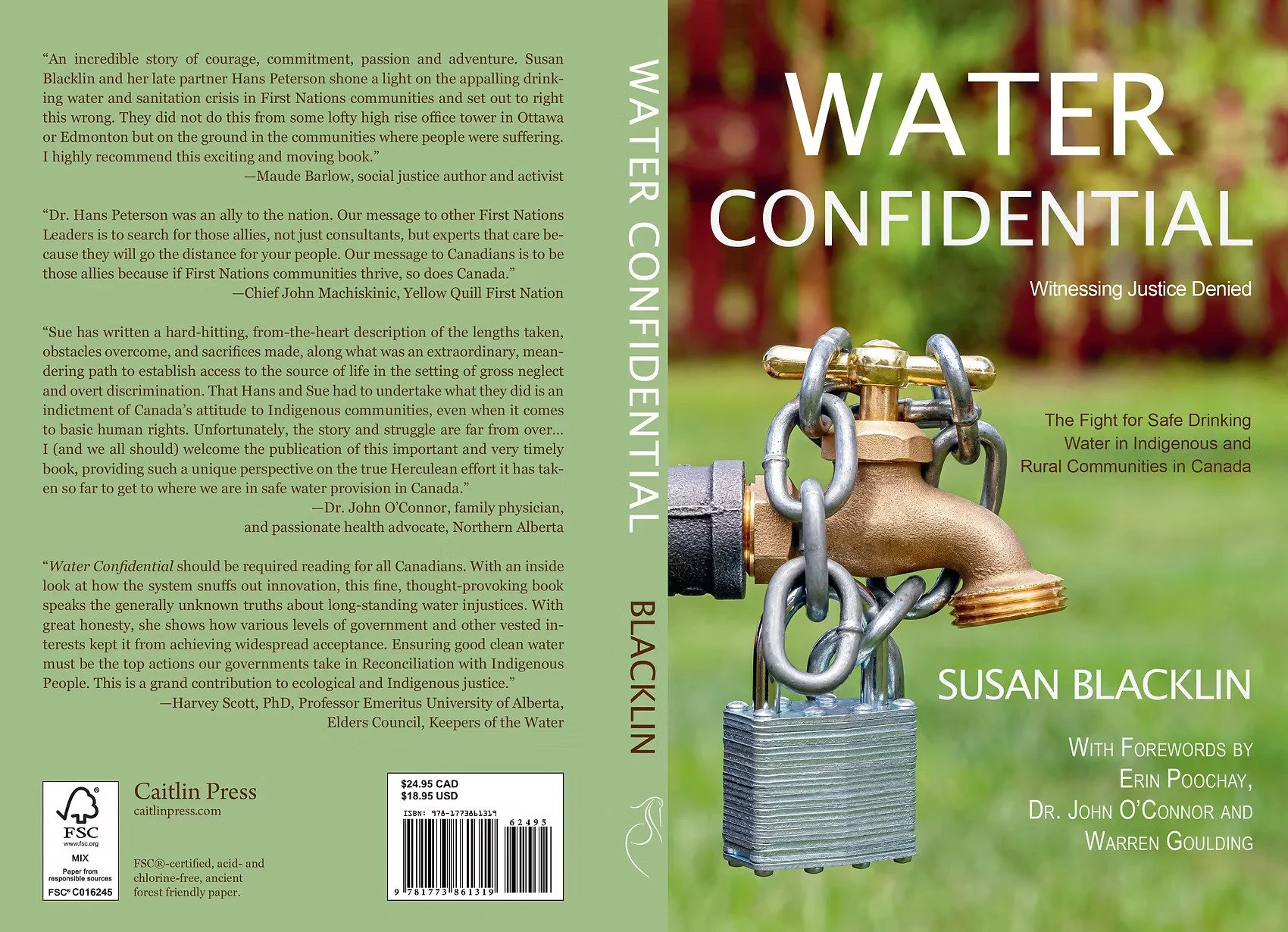Susan Blacklin - Published Author and Activist
Congress of Humanities selected Water Confidential to be included in Indigenous Studies curriculum in universities across Canada.
Here is how Susan describes her next book, Water Justice: What You Don't Know Could Kill You (available before year-end 2025!).
It is a sequel of sorts, covering the past eighteen months, and the many issues regarding drinking water that readers from across Canada brought to my attention. They were all eager to effect change, the result being fourteen organizations that banded together to launch a federal petition, which was in vain, as the government was prorogued. It is an exposé of the atrocious negligence of governments of all colours, federal, provincial, and municipal, and discloses how Canadians are at risk in urban and rural communities; this is not only an Indigenous issue.
While Water Justice’s main focus is on both source and treated drinking water, I also disclose what I believe is mismanagement of our tax dollars, as governments throw money to the wind with no improved water treatment processes. The challenges of filing Freedom of Information requests and actually obtaining answers, combined with huge government funding of research into water, with seemingly no application.
Please leave your contact information to be advised when Water Justice: What You Don't Know Could Kill You becomes available.
Susan donates all royalties from Water Confidential, shared equally between Safe Drinking Water Foundation and Keepers of the Water.
In Water Confidential, you will learn about the history of First Nations drinking water and the current state of water on reserves across Canada. You will also learn about the political and social factors that have contributed to the crisis and the challenges faced by First Nations communities in their efforts to secure safe and clean drinking water for all their people.
Essential Information
Drinking Water Advisories
You will find, in the following links, the number of Drinking Water Advisories in First Nations communities. It is important to learn about the different types of Drinking Water Advisories (DWAs): Boil Water Advisories (BWAs), Do Not Consume Water Advisories (DNCs), etc. It is also important to realize that this is not just an Indigenous issue. I suggest you click on and view the links in the order they appear below. There are hundreds of DWAs at any given time. They exist from coast to coast to coast. On November 2, 2025, there were 1687 DWAs across Canada. While Indigenous Services Canada (ISC) reported 38 long-term DWAs in 36 First Nations communities, Statistics Canada reported 37. ISC reported 72 short-term DWAs in First Nations communities.
WATERTODAY - Drinking Water Advisories
First Nations Long-Term Drinking Water Advisories
First Nations Short-Term Drinking Water Advisories
Statistics Canada’s Quality of Life Hub: Drinking Water
When Susan asked for information regarding a discrepancy between Indigenous Services Canada’s numbers of Drinking Water Advisories and First Nations Health Authority’s numbers of Drinking Water Advisories, she received the following response from First Nations Health Authority:
FNHA posts Drinking Water Advisories based on a summary of water systems with five or more connections (Community Water Systems), and smaller water systems that have public facilities i.e., Campgrounds (Public Water Systems). Public Water Systems include both Nation-owned and privately owned systems. Water systems on Leased Land are not included. ISC posts info on Community Water Systems owned and operated by the Nation and funded by ISC. The data sets used by FNHA and ISC are slightly different, but FNHA includes all that ISC posts. If you have questions related to the data that ISC posts, please reach out directly to ISC.
FNHA produces a monthly snapshot of advisories in BC First Nation communities. It includes both systems funded by ISC and systems not funded by ISC. It includes Water Quality Advisories, Boil Water Advisories, Do Not Consume Advisories, and Do Not Use Advisories. It includes long-term, short-term, and brief advisories. Sometimes, it includes advisories off-reserve for Public Water Systems owned and operated by a Nation.
For more information, please see the FNHA page on Drinking Water Advisories: https://www.fnha.ca/what-we-do/environmental-health/drinking-water-advisories

